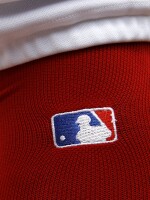Hong Kong police fired tear gas at costumed protesters who organized a Halloween "masquerade" Thursday to challenge a government ban on demonstrators wearing face masks. In early October, Hong Kong's Chief Executive Carrie Lam invoked colonial-era emergency powers to implement the ban.
The mask ban has been heavily ignored by protesters and police have struggled to enforce it. As party-goers and protesters donned costumes, police closed off sections of central Hong Kong and Kowloon before using tear gas to break up crowds at around 10 p.m. local time.
Protesters wore a wide range of costumes, including Guy Fawkes masks, Joker makeup and tear gas canisters. Some used the occasion to slight Chinese President Xi Jinping by wearing masks of his face or Winnie-the-Pooh, whose image has been long blocked from Chinese social media after people compared the bear's physique to the Chinese leader.

Earlier in the day, authorities had announced that Lan Kwai Fong, a popular district with a high concentration of bars and clubs, would be closed in anticipation of the protests. In a video, officials warned that they had the right to remove masks and arrest those who resist.
"Police do not rule out the possibility of any violent incident happening," police superintendent Louis Lau said.
Lan Kawi Fong is now shut down due to “unexpected public event”. Police calling people to leave via Wellington St & D’Aguilar St but they are all over cramped #antiELAB #AntiMaskLaw #HongKongProtests pic.twitter.com/hSblQkrQmh
— Galileo Cheng (@galileocheng) October 31, 2019
Pro-democracy lawmakers are raising money to challenge the mask ban in court, according to the Hong Kong Free Press.
The latest demonstrations follow the news that a prominent pro-democracy leader would be barred from running in Hong Kong's district council elections. Joshua Wong first emerged as an activist leader in 2011, in a student-led protest against the national curriculum, and rose to prominence in Hong Kong's Umbrella Revolution in 2014.

On Sunday, Paul Chan, the city's financial secretary, wrote that the longevity of the mass protests — which began in June — has affected several industries, which has led to a recession. The economy shrank by 3.2% in the most recent quarter, compared to the quarter preceding it.
"Following the quarter-on-quarter negative growth recorded in the second quarter, the economy continued to contract in the third quarter, which means Hong Kong's economy is technically heading into recession," Chan said. "The extent of contraction has magnified."
Paolo Zialcita is an intern with NPR's News Desk.
Copyright 2020 NPR. To see more, visit https://www.npr.org.



